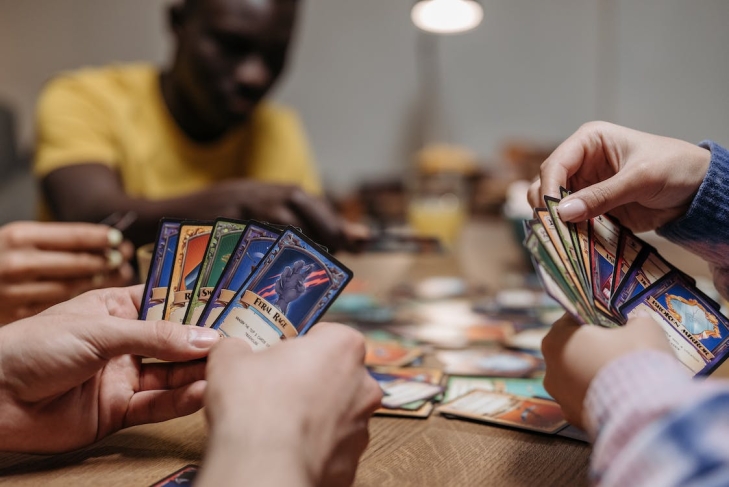The rise of 1win poker tournaments in India gaming scene
Discover how 1win poker tournaments help Indian players improve their skills while boosting the platform's popularity and success in the competitive online gaming market.
1win poker tournaments: a thrilling experience for India growing gaming community
The 1win platform has quickly gained popularity in the Indian online gaming community, thanks to its unique poker tournaments that offer both thrilling experiences and lucrative opportunities. These events are designed to cater to players of all skill levels, making it easy for beginners to get started while providing seasoned players with challenging, high-stakes competitions. The tournaments on 1win stand out not only for their accessibility but also for the way they enhance the overall poker experience by bringing a sense of community and excitement to the table.
For Indian players, participating in 1win India poker tournaments is more than just a game—it’s a chance to hone their skills, compete for substantial rewards, and engage with a diverse range of opponents from around the country. These tournaments provide a structured yet dynamic environment, where the thrill of competition is balanced with fair play and transparency. Moreover, the platform offers various types of poker games, including Texas Hold’em and Omaha, allowing players to explore different strategies and approaches to winning.
From the platform’s perspective, these poker tournaments are a key driver of user engagement. By hosting regular, well-organized events, 1win keeps its player base actively involved, fostering loyalty and encouraging repeat participation. The excitement and competitive spirit that poker tournaments generate not only enrich the user experience but also help solidify 1win position as a leading online gaming platform in India.
Beyond prizes: how 1win poker tournaments foster player development in India
Poker tournaments on the 1win platform are not just about winning prizes – they’re an excellent opportunity for Indian players to advance their skills and enjoy a deeper, more strategic gaming experience. These tournaments provide a structured environment where players can test their skills, learn from others, and steadily improve. Whether you're a beginner looking to sharpen your tactics or an experienced player seeking a new challenge, 1win tournaments offer a comprehensive platform for growth.
- Enhancing poker skills through real competition: one of the most significant advantages of participating in 1win poker tournaments is the opportunity to develop a deeper understanding of the game. Unlike casual games, tournaments require a player to think critically about each hand, carefully manage their bankroll, and make strategic decisions in real-time. As the tournament progresses, players are faced with different scenarios that push them to adapt and refine their poker strategy, ultimately improving their skill set.
- Building confidence and mastery: for many Indian players, participating in 1win tournaments offers a pathway to building confidence in their poker abilities. Competing against a wide range of opponents, from novices to professionals, gives players a chance to test themselves in a competitive yet supportive environment. This experience helps players to feel more comfortable with the complexities of poker, and over time, they can master both the technical and psychological aspects of the game.
- Financial incentives and long-term engagement: another key benefit of 1win poker tournaments is the financial incentives they offer. While sharpening their skills, players also have the chance to win cash prizes and bonuses. These rewards not only add excitement to the tournaments but also encourage long-term engagement with the platform. For Indian players, this mix of challenge and potential reward makes the experience all the more appealing.
|
Additional Benefits |
Explanation |
|
Structured Learning Environment |
Tournaments offer a focused setting for learning advanced poker strategies and decision-making. |
|
International Exposure |
Players can compete against global opponents, broadening their perspective on poker techniques. |
|
Regular Events and Challenges |
Consistent tournaments keep players engaged and motivated to improve their performance. |
|
Tailored for Indian Players |
Customized tournaments cater specifically to the needs and preferences of Indian poker enthusiasts. |
|
Diverse Game Formats |
Players can participate in various poker formats, ensuring a fresh and dynamic gaming experience. |
For Indian players, 1win poker tournaments provide much more than just entertainment. They offer a chance to continuously improve, grow within a community, and test their skills in a competitive arena. With the platform’s regular tournaments and opportunities for financial gain, 1win ensures that players not only enjoy the game but also evolve as poker enthusiasts, mastering both strategy and skill.
How poker tournaments drive 1win success in India online gaming market.
The popularity of 1win poker tournaments is not only a boon for the players but also a crucial factor in the platform's success within Indian gaming circles. These tournaments have become a driving force in attracting and retaining a diverse player base, enhancing the overall visibility and reputation of the platform. Here’s a closer look at how poker tournaments contribute to the growth and prominence of 1win in India.
- Increased user engagement: poker tournaments on 1win are designed to keep players actively engaged with the platform. The competitive nature of the tournaments, coupled with the opportunity to win real money, keeps users coming back for more. Frequent events ensure that players have something to look forward to, encouraging consistent participation and interaction on the site.
- Attraction of new players: the presence of high-stakes tournaments attracts new users to 1win, particularly those who are already familiar with poker or are interested in learning the game. The chance to compete in well-organized tournaments with significant rewards acts as a magnet, pulling in both casual and serious players. This influx of new users helps broaden 1win reach and solidify its position in the Indian gaming market.
- Strengthening brand reputation: by hosting regular poker tournaments, 1win strengthens its brand identity as a serious and reliable platform for online gaming. The consistency, fair play, and high-quality user experience offered in these tournaments boost the platform’s credibility. This reputation is particularly important in the competitive online gaming industry, where trust and transparency are key to long-term success.
- Promoting financial growth: poker tournaments are also a major source of revenue for the platform. Entry fees, combined with the volume of users attracted to these events, generate substantial income for 1win. Additionally, the success of these tournaments often encourages players to explore other gaming options on the platform, leading to increased overall spending and activity.
- Establishing leadership in the Indian market: hosting regular poker tournaments positions 1win as a leader in the Indian online gaming market. The platform’s commitment to offering a variety of tournament formats, along with generous prize pools, sets it apart from competitors. This leadership role helps 1win maintain a strong foothold in a rapidly expanding industry.
The success of poker tournaments on 1win has a profound impact on the platform's growth, popularity, and financial performance in India. By driving engagement, attracting new players, and building a strong community, these tournaments have become a cornerstone of 1win strategy to expand its presence in the Indian market. As the platform continues to innovate and offer competitive gaming experiences, its reputation and user base are set to grow even further.
Final thoughts: how 1win poker tournaments shape the future of Indian gaming
1win poker tournaments have proven to be a transformative element for both Indian players and the platform itself. For players, these tournaments offer an engaging way to sharpen skills, compete for rewards, and become part of a dynamic gaming community. On the platform side, the tournaments have driven significant growth, boosted user engagement, and solidified 1win reputation as a leader in India’s online gaming market. The combination of strategic development, financial incentives, and a supportive community ensures that 1win poker tournaments will continue to play a pivotal role in the platform's success.
The World’s Most Popular Card Games & Pros
Not all celebrities will attain global fame. Instead, they might become regionally or thematically famous. For example, the name Joey Chestnut might ring a vague bell in the heads of many. But only those who regularly follow eating contests would know that Chestnut is currently ranked Number One in the world of competitive eating.
The same is true for video games. Now that eSports teams and leagues are the subject of global headlines, players like Faker and s1imple are well-known like traditional sports athletes—even if their real names aren’t quite as catchy as their gamer names. But what about the unique subgenre of card games?
Like tabletop games and board games, card games might be smaller compared to eSports crowds—but fans are just as passionate and professionals are just as talented. Let’s dive into the world’s most popular card games and professional players, starting with the oldest: poker.
Poker
If you’ve ever played poker, then it was most likely the most common variation: Texas Hold’em. The World Series of Poker (WSOP) Main Event consists of no-limit Texas Hold’em poker—which is likely how you’ve heard of some of the biggest names in this industry, from Phil Hellmuth to Phil Ivey.
However, it’s important to note that virtual platforms such as PokerStars also feature other variations of the game, including Omaha. And there are plenty of other big-name pros aside from WSOP stars. Beyond live tournaments, many pros create other types of poker content that earn them massive followings. Lex Veldhuis, for example, is a poker pro known for his Twitch channels. Jennifer Shahade, on the other hand, is known for her exploratory podcast on various poker hands.
Magic: The Gathering
Similar to poker, Magic: The Gathering has been around for a while—and it’s hugely benefitted from ‘going digital’ back in 2002 (and then again with a separate release in 2018). Since then, the game has become more accessible for remote players who might not be able to head to a larger tournament or even to compete or collect cards. The latter is especially important, as this collectible card game requires players to slowly build an unbeatable deck.
The player pool is a bit smaller than poker, with between five and six million regular monthly players. But it has a comparatively developed list of celebrities. At the moment Kai Budde and Jon Finkel are considered some of the best players in the world. However, there are plenty of up-and-comers to keep an eye on, including 2023’s Global Champion Jean-Emmanuel Depraz.
Hearthstone
Officially, Magic: The Gathering is listed as a CCG or collectible card game. However, card games like Hearthstone are officially dubbed DCCGs or digital collectible card games. That’s because they were originally released digitally and have always been the subject of virtual competitions. Back in 2014, Hearthstone was released to build on the lore and popularity of the World of Warcraft series.
Since then, it’s become a hugely popular DCCG, regularly hosting competitions on par with WSOP and annual global competitions for Magic: The Gathering Pro Tour. Last year, the Hearthstone World Championship included a prize pool of $500,000, of which sixteen players (pulled from three separate leagues) competed for.
Gwent
Gwent is one of the latest DCCGs to take off—and it’s all thanks to The Witcher 3: Wild Hunt. Developers at CD Projekt Red decided to include a collectible card game to add depth and texture to the open-world RPG. The game ended up being so popular that it was re-released in 2016 as its own stand-alone DCCG game.
Since then, it’s risen quickly to become as popular as other DCCGs like Hearthstone. The GWENT Masters eSports series runs globally and culminates in various live events, similar to online poker. Because it’s such a new game, however, there aren’t quite as many star Gwent players to have stepped into the limelight. Benjamin Pfannstiel and Fred Bird are the world’s top-earning players, having both taken home more than $150,000 in lifetime earnings.
History of Poker: From the First Players to the Poker Hall of Fame
Poker is one of the most popular card games in the world, loved by both casual players and passionate gamblers. It's a good bet that you've heard of it, but do you know the history behind this classic card game?
While poker has been most popular among casino attendees, it is also known by card game fans all over the world. It can now even be played at home without physical cards with the help of online casinos, like the one you can access on the Luxury Casino Login page. Read on to learn a short history of the game and some of the most famous names in the field.
Origins and Early History
Poker has been around for centuries and has had a long history in America. It dates back to the 19th century, when it was first played by Native Americans and then later by settlers who traveled westward from Texas and Louisiana into California. However, this version of the game’s origin is not final, with many researchers arguing that it may have Persian or French roots.
The earliest known reference to poker comes from English actor Joseph Cowell’s description from 1829. After that, it was mentioned in the 1837 edition of Foster's Complete Hoyle. In the course of the 19th century, the game spread across the US, gaining more popularity at the beginning of the 20th century.
First Competitions
Professional poker players have been around for just as long, with the first tournaments drawing considerable crowds.
The World Series of Poker (WSOP) began in 1970 as a small satellite tournament at Binion's Horseshoe Casino in Las Vegas. The first incarnation was a small gathering that took place at Binion's Horseshoe Casino in Las Vegas. It was only meant to last one day, but because it was such a success, they decided to make this an annual event.
It wasn't until 1972 that it became an annual event, but by this point, people from all over were competing against one another for thousands of dollars in prize money. Now, it’s one of the largest poker tournaments in history—with more than a million entrants each year.
The formation of the World Series of Poker may have further cemented professional poker players into the public’s consciousness. The WSOP has inspired other notable tournaments that have come after its creation: The European Poker Tour, Asia Championship of Poker, and the Asia Pacific Poker Tour Macau Grand Prix all share some similarities with their predecessor, but also offer unique challenges to those who participate in them.
Poker Hall of Fame
In 1979, Benny Binion, designer of the WSOP, introduced an idea that all serious players could aspire to – induction into the Poker Hall of Fame.
Binion’s idea was to create a place where people could go and see the greats of the game. The thought that there would be an official list of players who had done something great in their careers was foreign and exciting at the time.
A number of professional players have made history by winning multiple WSOP bracelets. Some of the most notable multi-bracelet winners are Doyle Brunson, Johnny Chan, and Phil Ivey; all three have won more than 10 bracelets each.
In addition to these three legends, there are many other players who have been able to win multiple WSOP titles throughout their careers. For example:
- Erik Seidel won nine bracelets between 1992 and 2021;
- Daniel Negreanu won six bracelets between 1998 and 2013;
- Barry Greenstein won three bracelets in 2004-2008.
Conclusion
Poker has a rich history resulting in the Poker Hall of Fame as a way to honor the best and brightest players. There are many great professionals who deserve recognition for their contributions to the game we all love so much. Now that the game is easily accessible to everyone in their homes, whether you want to watch tournaments or play it yourself, you can join the development of its history and follow professionals in their successes.
John Juanda and Jennifer Harman named to Poker HOF
As you may have guessed, that selection took place today.
Jennifer Harman and John Juanda will become the 49th and 50th members of the Poker Hall of Fame. Two days after their induction, the World Series of Poker will take place at the Rio Casino.
Harman, a native of Reno, is one of two women to win a World Series of Poker bracelet twice. The 50 year old sat at the final table at the World Series twelve times.
Juanda is originally from Indonesia and now makes his home in Marina del Rey, California. The 44 year old won five WSOP bracelets and sat at the final table thirty times.
We here at Notinhalloffame.com would like to congratulate the new inductees to the Poker Hall of Fame and the Hall in general for their swift practices…much like the game itself!





